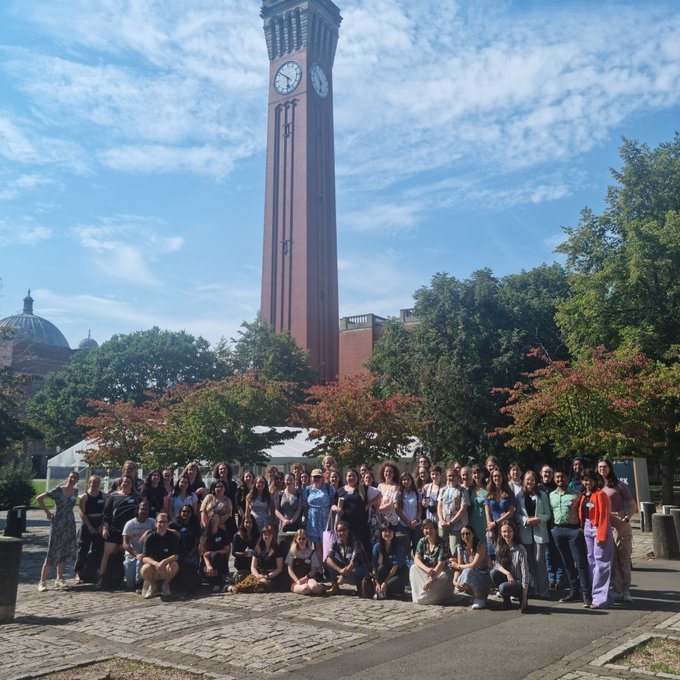EDI activity from the School of Mathematical Sciences presented at PiFORUM
PhD student Adam Onus recently presented some of the School's Equality, Diversity and Inclusion (EDI) work around diversifying the maths curriculum at the third annual PiFORUM run by the Piscopia Initiative. We spoke to them about the school's work in EDI, their experience of presenting at the conference and why events like this are important for women and non-binary people in maths.

Group photo from PiFORUM 2023 courtesy of the Piscopia Initiative
Who are the Piscopia Initiative and what is PiFORUM?
The Piscopia Initiative encourages women and non-binary people to pursue research degrees in maths. It began a few years ago in Scotland and has since spread further with 13 local committees across UK. Their target audience are undergraduate and masters students, for whom they hold many networking and professional development events, but they also shine a light on the research of early career women and non-binary people. PiFORUM is their annual one-day conference. The third annual PiFORUM was held at the University of Birmingham in September 2023 with around 60 attendees from across undergraduate, masters and doctoral study levels.
What did you present?
I presented work that is part of an ongoing EDI project on diversifying the maths curriculum on behalf of Prof Claudia Garetto (the School’s EDI Lead), eight other PhD students and four post-doctoral students.
Our project looks to increase representation of underrepresented groups in our undergraduate curriculum. For this we have made almost 60 short biographies of mathematicians, several posters expanding on these biographies that will be displayed in the School, and we have interviewed more than a dozen mathematicians from a range of career levels, within and beyond academia.
How was your presentation received?
I presented a summary of this work as both a talk in one of the parallel sessions and in the poster session afterwards. In both, I received great engagement from people across all career levels who were interested in our work. Many undergraduate, masters and PhD students expressed how thankful they were to see some of the examples of representation we have covered, which importantly also covers the intersectionality of each persons’ human experience. I was asked many questions on how we have implemented our material and how other institutions can apply similar measures. Since the conference I’ve spoken with people in Leicester, Birmingham, Nottingham, Edinburgh, Imperial College and the Open University who either want to share our work, become a part of the project themselves, or want to promote a similar initiative at their institution.
What did you gain from attending PiFORUM?
It was fantastic to meet so many like-minded people who will be the next generation of academics and see their work, both in research and in improving the social culture of academia. It is so great that such a positive community is growing within maths.
I can only imagine how inspiring I would have found it as an undergraduate student to see so much representation of women and non-binary people, all the different types of research that can be done from astrophysics, to mathematical modelling, to probability and stochastics, to number theory, to have a panel session with people at different stages of their career in and out of academia, and everything else that surrounded this.
Why are events like PiFORUM important?
I think there are two main reasons that events like PiFORUM are important.
Firstly, building a supportive community in academia is important. We also try to highlight this in our project. While there is still inequality, underrepresented groups grow by supporting and building around each other. Visibility is important, so the visibility and reach of these events is vital.
Secondly, events like PiFORUM bridge the gap between undergraduate and postgraduate students and different levels of study. This reduces much of the ‘maths anxiety’ that people experience which historically has deterred them from pursuing the subject further. The few events like PiFORUM or the other events run by Piscopia often give students their first encounter with research level maths, which is tailored to them and nurtures uncertainty rather than punishing it. Events like this are important for showing students that they belong in maths and can call themselves mathematicians.
Our school is very proactive in its EDI initiatives. Do you think the work we do can inspire other schools and universities?
A lot of this work is entirely off the back of Claudia’s tireless campaigning on many issues. Under Claudia’s lead, EDI in the SMS has been very active in starting initiatives and seeing them through, and along the way has built a group of likeminded people who make it easier to share the workload and increase the reach. Since joining QMUL, and particularly since participating in many of these initiatives, I and many others now feel in a position where we can action real change if we set our minds to something.
This to me is what puts our work ahead and what can inspire other schools and institutions to do the same. We stand up and provide action to progress change and support QMUL’s vision. Presenting our work to other schools within QMUL and other universities has inspired them to instigate similar schemes themselves while also encouraging us to extend our reach further. Often, it just takes one group’s hard work to inspire the work of others.